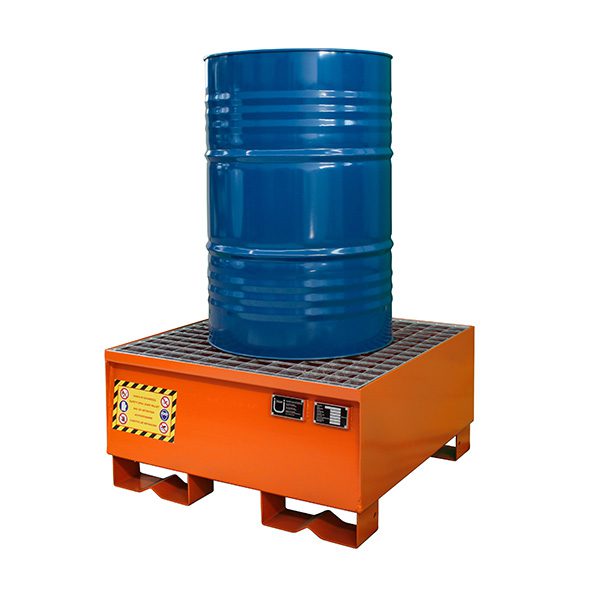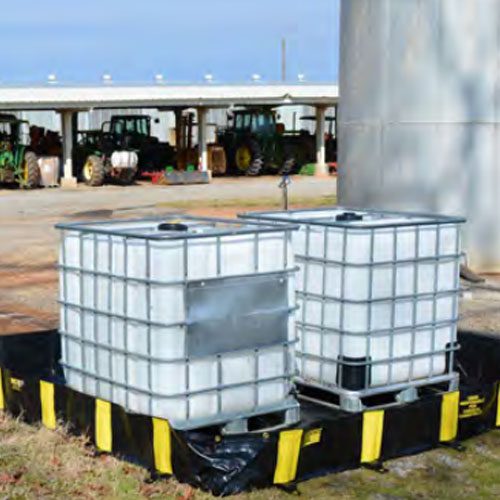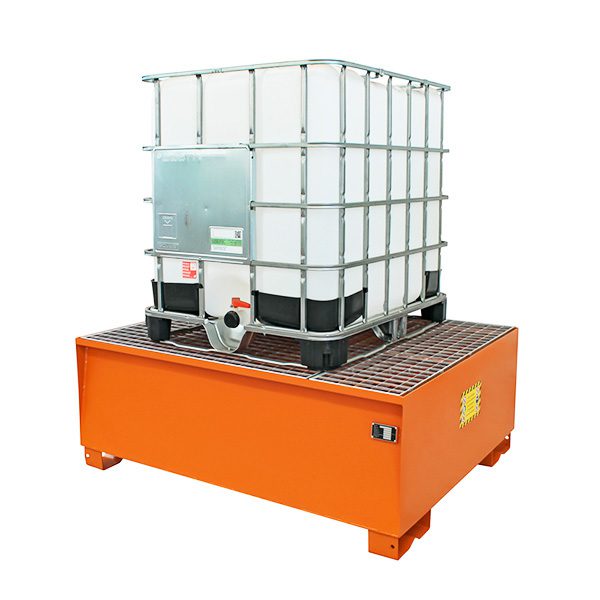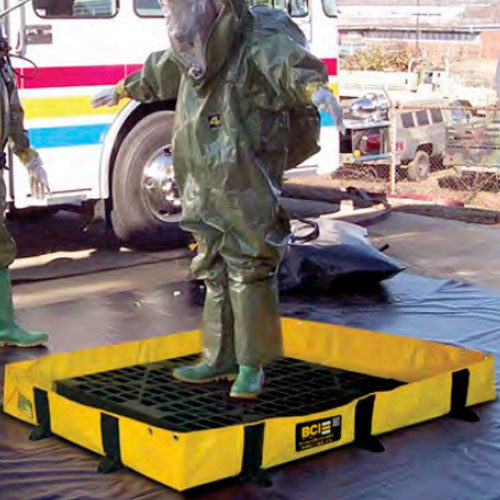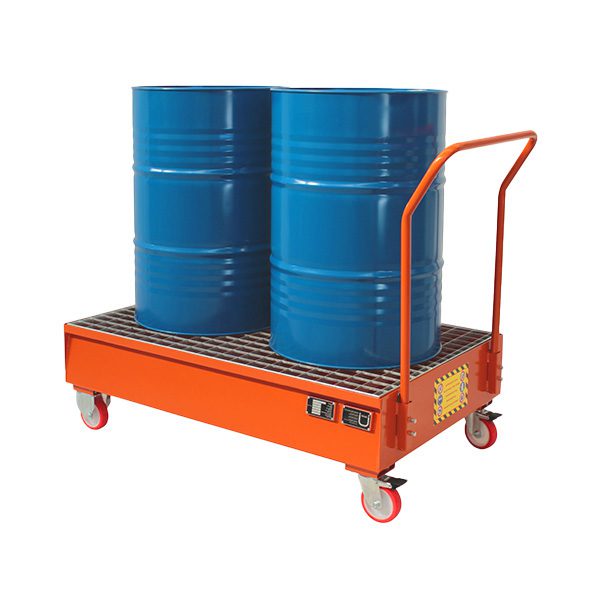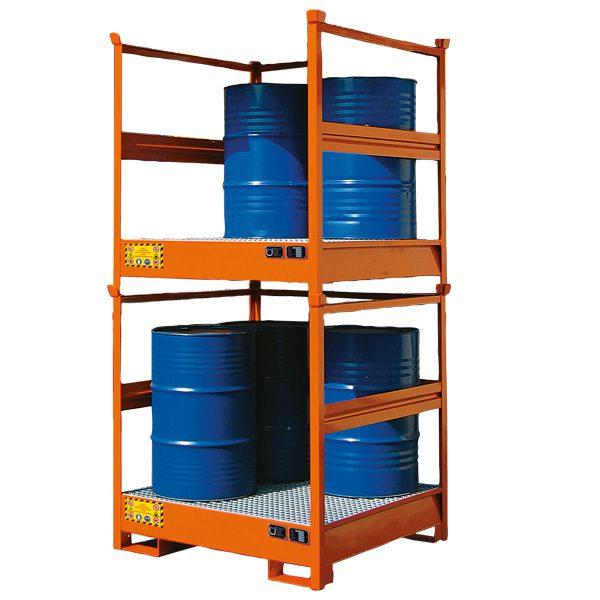Discover Our Range of Reliable Spill Pallets and Containment Systems
Bunded spill containment pallets for people and environmental safety
Discover Sall’s complete lines of steel and plastic spill containment pallets for chemicals, hazardous materials, pollutants, flammable substances, acids, and corrosive liquids.
At Sall, the Justrite Italian EU headquarters, we understand the importance of spill containment in maintaining a safe and clean environment. Sall-branded spill containment pallets are designed to provide robust protection against leaks and spills, helping you comply with regulations and safeguard your premises. Spill containment pallets and bunds are indeed essential and necessary equipment for the safe storage of drums, 1000-litre tanks, IBCs, and other containers holding polluting and dangerous liquids.
Durable and efficient spill containment pallets
Sall spill containment pallets are engineered and manufactured for the highest durability and efficiency. Made from high-quality certified steel, they are designed to withstand weather, rust, and offer superior resistance to chemicals and oils. With various sizes and load capacities available, you can find the perfect spill pallet to meet your specific requirements.
Reliable Spill Containment Systems
By choosing Sall spill containment pallets, you demonstrate your commitment to environmental responsibility. Our products are designed to help you comply with regulations regarding chemicals, hazardous materials, and pollutants storage while minimizing the risks associated with spills in the surrounding environment. Protect your business, employees, and the environment with Sall spill containment solutions!
Contact us now to discuss your spill containment requirements in your industrial sector and country.
How many types of bunded spill pallets exist and how to choose the one you need?
First, spill pallets can be made of either steel or plastic materials.
Commonly, we tend to choose steel bunds for the storage of dangerous, polluting substances that are not corrosive and plastic tanks for highly corrosive acids. But is this really the case?
Sall steel spill pallets can, in fact, be equipped with internal plastic coating, including polyethylene, specially selected for the storage and containment of acids or can be made of stainless steel.
This coating makes Sall steel collection tanks the best choice in terms of safety, durability and resistance even for highly corrosive acids combining the advantages of the steel structure with those of polyethylene, or other plastic material, with regard to corrosion resistance properties.
Stainless steel spill sumps are instead suitable for containing a wide variety of liquids and chemicals, including acids.
The choice of stainless steel bunded pallets, produced by Sall upon request, is typically the first choice for companies operating in the food industry and the pharmaceutical chemical industry.
So when do we need the plastic bunds?
Justrite plastic spill containment pallets are available in standard or foldable and portable versions.
Plastic spill sumps have the advantage of being lightweight and can safely contain acids, alkaline substances, pollutants and dangerous that are not flammable.
Polyethylene bunds, like their steel counterparts, can be moved with a forklift and do not require rust treatment.
Substances for which plastic spill containment pallets are usually used include boric acid, hydrochloric acid, phosphoric acid, formic acid, chloroacetic acid, potassium acid, motor oil, and alkaline substances (bases).
As mentioned above, however, the choice no longer depends solely on the type of liquid, as stainless steel or polyethylene bunds are also ideal for acids, but it depends on the type of use and the industrial sector.
Types and uses of steel spill containment pallets
- Steel spill containment pallets: versions in galvanized steel or painted steel are suitable for the internal storage of dangerous, polluting, and flammable substances and can be handled with a forklift.
- Stainless steel spill containment pallets: particularly suitable for the food and pharmaceutical chemical industries for the containment of chemicals, dangerous materials, pollutants, flammable substances, and acids. They can be handled with a forklift and are suitable for internal storage. Available on request for both standard models and custom specifications.
-
Steel spill pallets with polyethylene internal coating: recommended for acids, corrosive liquids, and bases.
Thanks to the durability and strength of the steel structure, they allow you to recover investment costs in the medium to long term. They can also be transported with a forklift (in compliance with safety guidelines, we suggest transporting empty spill pallets with a forklift). Coating is available on request for all standard models and custom-made bunded spill pallets.
Types and uses of plastic spill containment pallets
- Polyethylene spill pallets: these minimize the initial investment costs, offer the advantages of greater lightness and are suitable for polluting liquids, dangerous substances, acids, alkalis but not for flammables. They can be handled with a forklift or pallet truck. – Browse the catalogue and contact us for the best offer.
- Flexible and portable spill containment berms made of PVC: these are ready-to-use solutions that offer maximum flexibility. Thanks to their extreme lightweightness and strength and the exclusive Justrite BC materials, they are ideal for emergency situations where you need to act immediately, effectively, and quickly. They can be effectively used as a base for portable safety showers and for containing spills with tanker trucks, IBC tanks, and other equipment that can cause leaks and more. This flexible and portable spill containment system is also available in drive-over versions, suitable for heavy vehicles such as trucks. They are ideal for kegs, 1000-litre tanks, jerrycans, and equipment that can lead to leaks and more.
- Bunded drum trolleys: these are steel trolleys with integrated spill pallets for drums and other small containers. Made of galvanized or painted steel, they can also be equipped with polyethylene internal coatings or other anti-acid materials. This type of tank is necessary for the transport of 200-litre barrels and other smaller containers to prevent the risks of spills and leaks during transport. They allow for practical and easy manual handling even in confined spaces, thanks to Sall’s compact design.
Spill containment regulations
The continuously evolving UK regulatory framework for environmental protection and workplace safety can sometimes make it difficult to clearly understand the rules applicable by industry, substance, and safety guidelines. Spill containment plays a critical role in combating pollution and protecting workers. In the UK, numerous applicable norms and regulations, both general and local, exist, and failure to comply with them can result in costly fines or even convictions in the worst-case scenario. Here, we provide a list of applicable spill containment regulations to shed light on this complex topic.
Environmental and Workplace Safety Regulations applicable in UK:
Health and Safety at Work etc. Act 1974: This is the primary piece of legislation that sets out the general duties of employers to ensure the health, safety, and welfare of employees and others in the workplace. It may require employers to implement spill containment measures as part of their overall health and safety strategy.
Control of Substances Hazardous to Health (COSHH) Regulations: COSHH regulations require employers to assess and control the risks associated with hazardous substances, including the prevention of spills and leaks. Employers may be required to use spill containment pallets to minimize the risk of hazardous substance spills.
The Environmental Protection (Spill, Prevention, Control, and Countermeasures) (Amendment) SPCC Regulations 2009: These regulations specifically address the prevention, control, and mitigation of environmental spills, including those involving oil and other hazardous substances. They may require certain industries to have spill containment measures in place, such as spill containment pallets, to prevent and control spills.
The Dangerous Substances and Explosive Atmospheres Regulations 2002 (DSEAR): DSEAR regulates the control of substances that are potentially explosive, flammable, or pose other risks. If your workplace deals with such substances, you may need to comply with DSEAR requirements, which can include spill containment measures.
Health and Safety Executive (HSE) Guidance: The HSE provides various guidance documents and resources related to spill containment and hazardous substances handling. These documents can offer practical advice on selecting and using spill containment pallets in compliance with UK regulations.
Of course, depending on your location within the UK, there may be additional local or regional environmental regulations that apply to spill containment and hazardous materials management as well as industry-Specific Regulations.
Certain industries, such as the chemical, oil, and pharmaceutical industries, because of the substances regularly used in their processes and considering the regional environmental protection norms can potentially cause environmental damages and pollution indeed.
Locally applicable regulations in UK for spill containment are mainly:
England: The Control of Pollution (Oil Storage) (England) Regulations 2001. These regulations aim to safeguard the environment and controlled waters in England by ensuring that oil storage is carried out to minimize the risk of pollution. Any violation may result in costly fines or penalties, conviction on indictment to an unlimited fine or on summary conviction to a fine not exceeding the statutory maximum (currently £5,000).
Scotland: The Water Environment (Controlled Activities) (Scotland) Regulations 2011 also known as Controlled Acti8vity Regulations (CAR) provides a framework for controlling various activities, such as industrial processes, agriculture, construction, and waste disposal, that could potentially cause rivers, lakes, and other water bodies pollution. It sets out also specific requirements for obtaining permits and authorizations for such activities to ensure they are conducted in an environmentally responsible manner.
Northern Ireland: The Control of Pollution (Oil Storage) Regulations (Northern Ireland) 2010, commonly referred to as the Oil Storage Regulations, defines specific rules and requirements for safely storing oil. These regulations aim to protect the environment and human health by preventing oil spills and leaks. Among the key points this regulation states that oil storage containers must have adequate secondary containment to prevent oil from escaping in case of leaks or spills.
Wales: The Water Resources (Control of Pollution) (Oil Storage) (Wales) Regulations 2016 is a clear set of rules to prevent the water bodies pollution from oil storage facilities. These regulations require both individuals and businesses to safely store oil in order to minimize the risk of leaks or spills that could lead to environmental pollution.
The key points of this Wales’s regulation are:
- Oil Storage Tanks: oil storage tanks must be designed and constructed according to specific standards to prevent leaks and spills.
- Secondary spill containment: all facilities must adopt secondary spill containment countermeasures to properly respond to any leaks or spill of oils that may occur.
- Regular inspections: all the oil storage equipment must undergo regular inspections and maintenance to ensure proper working conditions.
- Record-keeping: operators must keep track of inspections, maintenance and any accidents related to oils storage.
- Environmental risk assessment: businesses must perform environmental risks assessment for their oil storage and take adequate countermeasures.
- Training: workers involved in oil handling and storage operations must be properly trained to respond in case of oil spills and emergencies.
- Notification of incidents: workers and operators must notify any oil spills and incidents that may cause harm to the environment.



